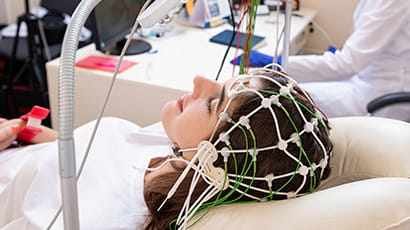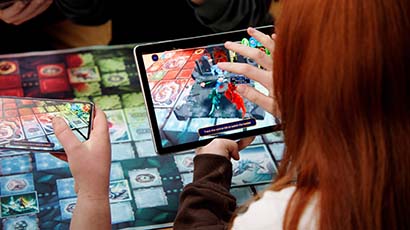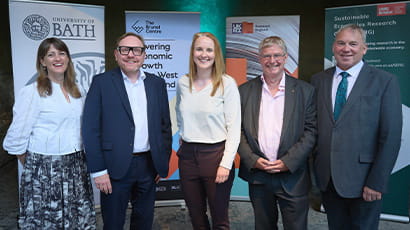3D-printed brains reveal Alzheimer's secrets

The University of the West of England (UWE Bristol)'s Health Tech Hub has printed three 3D brain models that show the effects of dementia on the organ. Printed for Bristol based dementia charity BRACE, the models each have a section missing, which offers views of the inside of the organ and how the disease has depleted its density.
Using brain scans and 3D imaging provided by clinical dementia research group ReMemBr Group, which BRACE part-funds, the Health Tech Hub was able to accurately produce two Alzheimer's diseased brain models and a healthy brain model exactly to scale, using a 3D printer. Each brain took 72 hours to print and is made out of a resin material. The Health Tech Hub covered the full cost of production.
Alzheimer's disease causes progressive atrophy to the brain - a wasting away and shrinking of the brain tissue, which happens at a much faster speed than the old age-related shrinking that would be expected in a healthy brain. The printing of these models will enable BRACE, the ReMemBr Group and the South West Dementia Brain Bank to use them as aids to teach and raise awareness of dementia.
Health Tech Hub Co-Director Professor Richard Luxton said: "These models mean you can physically see the effects of dementia and it's shocking the extent to which a brain touched by Alzheimer's wastes away. You can see that the ventricles [cavities in the organ] are bigger because of lost brain tissue and the two diseased brains are also noticeably lighter compared to the healthy one."
Dr Elizabeth Coulthard of the ReMemBr Group said: "By printing from real brain scans, we can clearly see which areas of the brain are affected by dementia diseases such as Alzheimer's disease. The areas of brain that shrink are different in different dementias.
"The memory area, called the hippocampus, shrinks early on in Alzheimer's disease. In contrast, the front of the brain shrinks first in behavioural variant frontotemporal dementia (Pick's disease)."
Dr Laura Palmer, manager of the South West Dementia Brain Bank said: "A healthy brain weighs between 1,300 and 1,400 grams; however, a brain with Alzheimer's will weigh between 1170 and 1260 grams. In people with end-stage Alzheimer's disease we often find that the brain can weigh as little as around 1000 grams at the time of death.'
The world-class Health Tech Hub facility at Frenchay campus is focused on advancing technology that enables people to live independently and manage their own health and well-being, thereby ensuring they spend the least possible time in hospital.
It works with health technology organisations and companies in the region, helping them with product development and prototype testing. Projects it is involved in include DNA sequencing, looking at the chemistry of biosensor surfaces, and visualising DNA from bacteria.
The Health Tech Hub is partly funded by the European Regional Development Fund and the Local Grow Fund through the Local Enterprise Partnership.
Related news

12 December 2025
UWE Bristol’s environmentally conscious and student-focused accommodation wins three awards
Purdown View, the world's largest certified Passivhaus student accommodation development, has been recognised at Property Week Student Accommodation Awards.

25 November 2025
Health-tech start up MyCelsius launches breakthrough cooling tech for hot flushes developed at UWE Bristol’s Launch Space
A pioneering Bristol-based health-tech company developing cutting-edge cooling technology for hot flushes has credited UWE Bristol’s Launch Space incubator with playing a key role in accelerating its product development.

14 November 2025
Lecturer wins prestigious Times Higher Education award for innovation in teaching
A senior paramedic science lecturer at UWE Bristol has been named the most innovative teacher of the year in the Times Higher Education Awards 2025.

13 November 2025
Alliance Medical and UWE Bristol launch UK’s first PET-CT postgraduate certificate
In a move set to transform imaging education, Alliance Medical (AML) and UWE Bristol have joined forces to co-design and develop the UK’s first PET-CT Postgraduate Certificate (PG Cert).

13 November 2025
New AI research to revolutionise animal welfare
A UWE Bristol research project will combine behavioural science and AI to create technology that understands not only what animals do, but how they feel.

29 October 2025
UWE Bristol academic unveils breakthrough in energy-efficient AI at NATO science forum
Dr Jonathan Lancelot has developed a new form of AI that could transform how intelligent machines operate in space, defence, and remote environments.

07 October 2025
Academic playing role in project to find hidden graves in Mexico using drone technology
A UWE Bristol lecturer is playing a part in a project using drone technology to locate concealed graves in Mexico.

01 October 2025
New funding for researchers to develop trustworthy clinical AI for assessing brain activity
Researchers have received funding from UK Research and Innovation to help bring their innovative brain-monitoring AI technology closer to real-world use.

11 September 2025
New study to investigate augmented reality as an intervention for emotionally based school avoidance
A UWE Bristol researcher will support a new study exploring whether an augmented reality board game can help young people with emotionally based school avoidance (EBSA).

22 August 2025
A decade of Future Space: How UWE Bristol’s enterprise zone is powering innovation and economic growth
Tracey John, Director of Research and External Engagement, reflects on the impact of Future Space and its role as a launchpad for cutting-edge companies shaping the future of how we live and work.

11 July 2025
Wound dressings developed with support from UWE Bristol to be launched by global firm
Technology that a team of UWE Bristol scientists helped develop to aid the healing of chronic wounds will be used in new ‘smart dressings’ being launched by global medical company.

03 July 2025
Research lab The Brunel Centre opens to power sustainable and inclusive growth for the West of England
A new data and research centre designed to support sustainable and inclusive growth and industrial strategy in the region, has officially launched.






